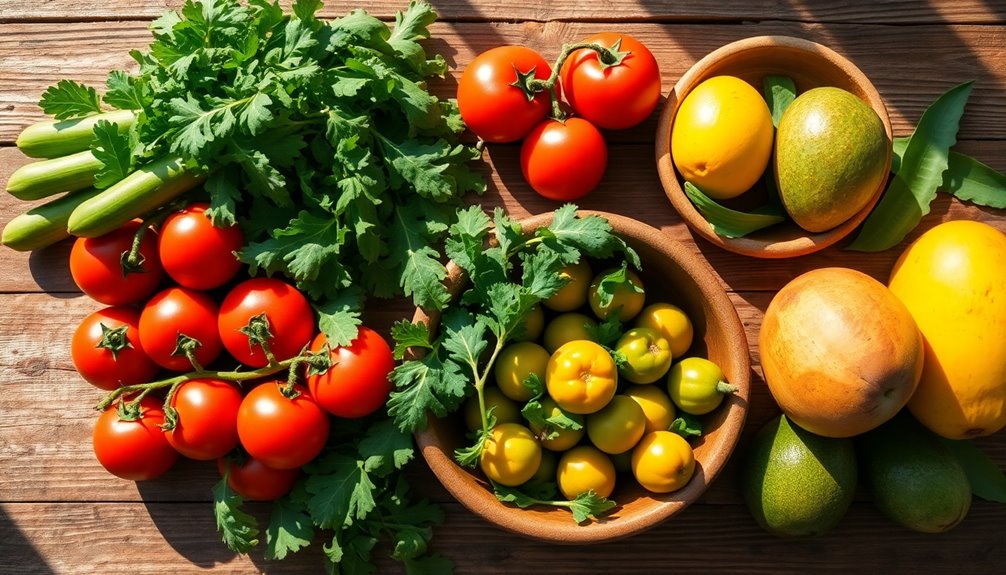A vegan diet cuts out all animal products, focusing instead on a variety of plant-based foods. This approach not only supports your health, offering benefits like weight loss, better digestion, and clearer skin, but it also champions environmental sustainability by lowering your carbon footprint. However, you need to be mindful of essential nutrients such as protein, vitamin B12, iron, and omega-3 fatty acids to maintain a balanced diet. Meal planning can help you enjoy diverse meals and snacks. If you want to understand more about getting started and the community surrounding veganism, there's plenty more to explore.
Key Takeaways
- A vegan diet excludes all animal products, focusing solely on plant-based foods for nutrition and health benefits.
- Key health benefits of veganism include weight loss, improved digestion, increased energy, and enhanced overall well-being.
- Essential nutrients to monitor in a vegan diet are protein, vitamin B12, iron, calcium, and omega-3 fatty acids.
- Veganism supports environmental sustainability by reducing carbon footprints, conserving water, and helping preserve wildlife.
- Joining vegan communities can provide support, inspiration, and resources for successful meal planning and nutritional balance.
What Is a Vegan Diet?
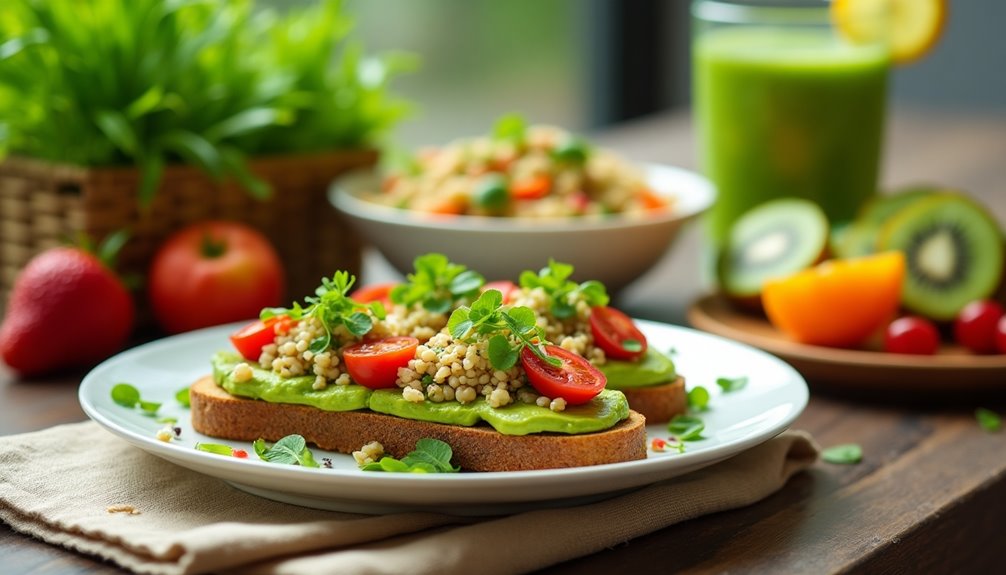
A vegan diet excludes all animal products, including meat, dairy, eggs, and even honey. By embracing this diet, you're not just making a choice about what you eat; you're adopting a vegan lifestyle that emphasizes compassion and sustainability. This lifestyle is rooted in the belief that all living beings deserve respect and that our food choices greatly impact the environment.
Plant-based nutrition is at the core of a vegan diet. You'll find yourself focusing on a variety of fruits, vegetables, whole grains, legumes, nuts, and seeds. These foods are rich in essential nutrients and can provide your body with everything it needs to thrive. When you explore this way of eating, you'll discover a colorful array of foods that can bring excitement to your meals while promoting overall well-being.
It's essential to educate yourself about nutrition as you make the shift to a vegan diet. Some nutrients, like vitamin B12, iron, and omega-3 fatty acids, may require special attention since they're commonly found in animal products. By planning your meals thoughtfully, you can guarantee that you're meeting your nutritional needs without compromising your values. A well-planned vegan diet can also reduce the risk of chronic diseases, helping you to maintain optimal health.
Joining the vegan community can also enrich your journey. Engaging with others who share similar beliefs can provide support, inspiration, and a sense of belonging. As you navigate this lifestyle, remember that every step you take toward plant-based nutrition is a step toward a more compassionate and sustainable world.
Health Benefits of Veganism
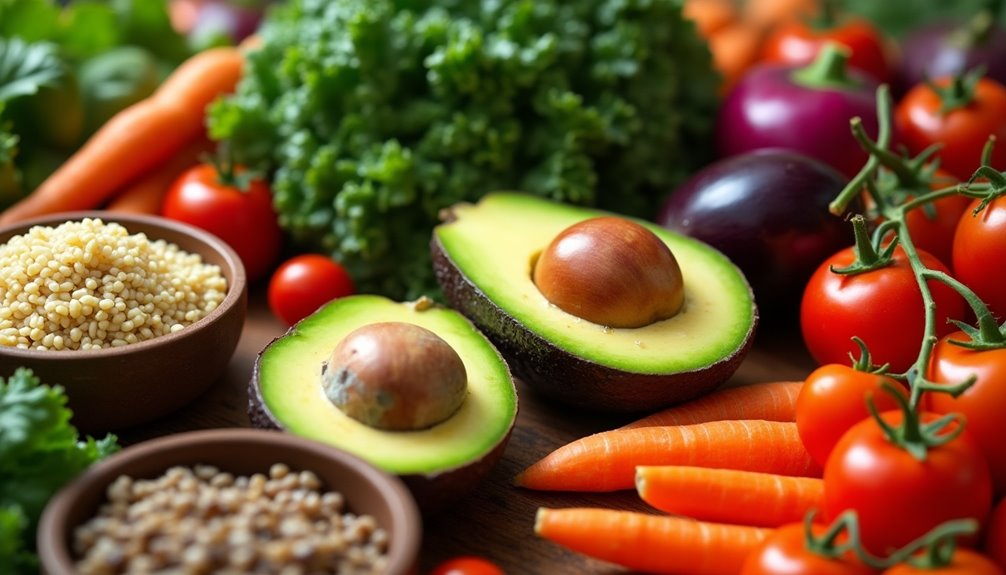
Embracing a vegan lifestyle can lead to numerous health benefits that support both physical and mental well-being. Research consistently shows that a plant-based diet can facilitate weight loss. By focusing on whole foods like fruits, vegetables, legumes, and grains, you naturally consume fewer calories while still feeling full, allowing you to shed those extra pounds without feeling deprived.
Moreover, a vegan diet promotes improved digestion. The high fiber content from plant-based foods helps maintain regular bowel movements and supports a healthy gut microbiome. This enhanced digestion can lead to reduced bloating and discomfort, making you feel lighter and more energized throughout the day.
Increased energy is another significant benefit you'll likely experience. By eliminating animal products, you might find that your body has an easier time absorbing nutrients from your food. With more energy at your disposal, you can engage in activities you love and feel more vibrant in your daily life.
Additionally, many people notice clearer skin after adopting a vegan diet. The abundance of antioxidants in plant foods can help reduce inflammation and combat acne, leaving your complexion looking fresh and radiant. Furthermore, embracing a vegan diet can lead to improved digestion and gut health, enhancing your overall well-being.
Common Misconceptions
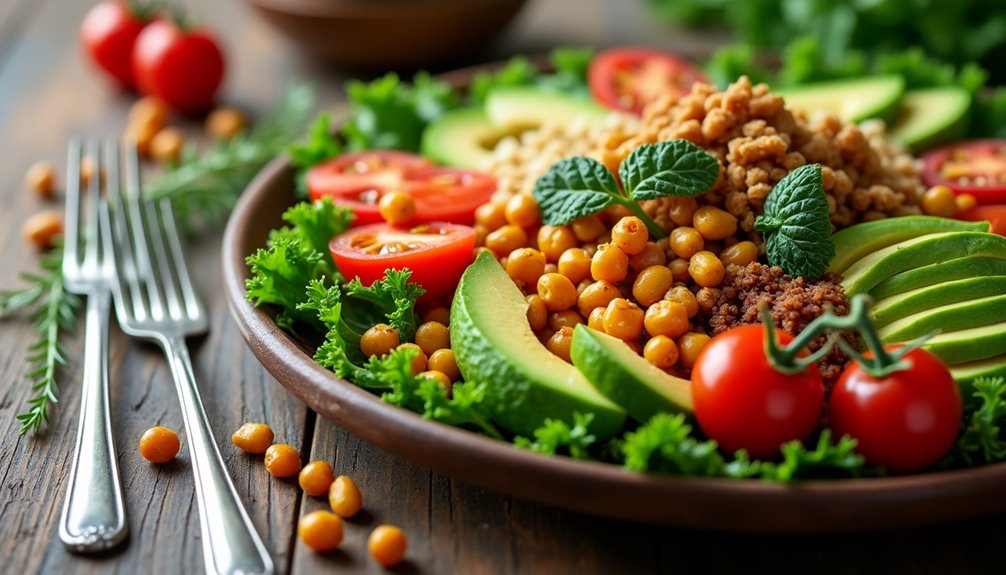
Many people hold misconceptions about vegan diets that can deter them from considering this lifestyle. One of the most common myths is that vegans can't get enough protein. In reality, there are numerous plant-based protein sources available, such as lentils, chickpeas, quinoa, and various nuts and seeds. By diversifying your meals, you can easily meet your protein needs without animal products.
Another misconception revolves around Vitamin B12. While it's true that B12 is primarily found in animal products, this doesn't mean vegans are doomed to deficiency. There are fortified foods, like plant-based milks and breakfast cereals, that can provide adequate B12 levels. Additionally, B12 supplements are widely available and can be an effective solution for those following a vegan diet.
Some folks think that a vegan diet is inherently unhealthy or too restrictive. However, with a bit of planning, it can be balanced and nourishing. You can enjoy a wide variety of delicious foods, from hearty grain bowls to vibrant salads and satisfying smoothies. Moreover, incorporating protein-packed vegan smoothies into your diet can enhance energy levels and serve as a nutritious meal replacement.
Essential Nutrients to Consider
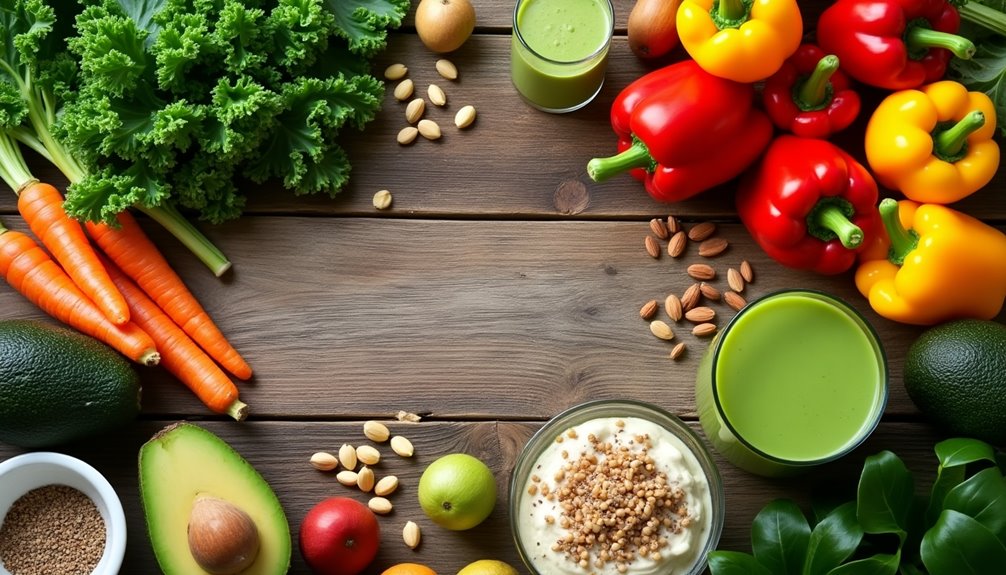
Understanding the nutrients that are necessary for your health is essential when adopting a vegan diet. While plant-based eating can be incredibly rewarding, it's important to make sure you're meeting your nutritional needs to avoid potential vitamin deficiencies.
One key nutrient to focus on is protein. Many new vegans worry about getting enough protein, but there are plenty of excellent protein sources available. Legumes, lentils, chickpeas, quinoa, nuts, and seeds all provide ample protein while offering various other health benefits. Incorporating a variety of these foods can help you meet your protein requirements without sacrificing taste or nutrition.
Another nutrient that often requires attention is vitamin B12. This vitamin is primarily found in animal products, making it necessary for vegans to seek fortified foods or consider supplementation. A deficiency in B12 can lead to serious health issues, including anemia and neurological problems.
Additionally, pay attention to iron and calcium. While plant sources like spinach, tofu, and fortified plant milks can provide these nutrients, they may not be absorbed as efficiently as those from animal products. Pairing iron-rich foods with vitamin C sources, like citrus fruits, can enhance absorption.
Lastly, omega-3 fatty acids are essential for heart and brain health. Flaxseeds, chia seeds, and walnuts can help you meet your omega-3 needs. By being mindful of these necessary nutrients, you can enjoy a balanced and fulfilling vegan diet that supports your overall well-being. Moreover, following a structured plan like the 1 Month Vegan Challenge can aid in ensuring you receive all essential nutrients while transitioning to a vegan lifestyle.
Meal Planning Tips
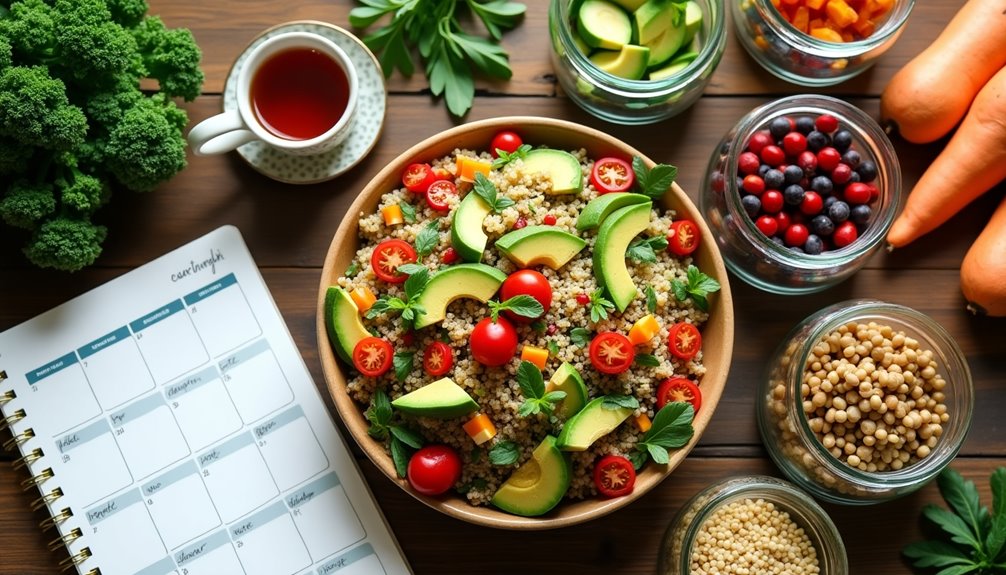
Effective meal planning can greatly enhance your vegan diet experience. It not only helps you stay organized but also guarantees you're meeting your nutritional needs while being budget-friendly. Start by creating a grocery list tailored to your weekly meals. This simple step minimizes impulse buys, allowing you to focus on whole foods like fruits, vegetables, legumes, and grains that are both nourishing and cost-effective.
Consider batch cooking on weekends. Preparing large portions of grains, beans, and roasted vegetables saves time during the week and reduces your reliance on takeout, which can be expensive. Store these components in the fridge for easy access, making it simpler to assemble balanced meals.
Don't forget to plan for snacks! Include budget-friendly options like hummus with carrot sticks or homemade energy bars. This keeps you satisfied and less likely to reach for unhealthy choices.
Additionally, explore local farmer's markets for seasonal produce. This not only supports your community but can also save you money. Use your grocery list to incorporate these fresh finds into your meals, ensuring variety and seasonality.
Lastly, keeping your meals simple can be a game-changer. Focus on versatile ingredients that can be used in multiple dishes, reducing waste and cost. By implementing these meal planning tips, you'll cultivate a fulfilling vegan lifestyle that fits your budget and dietary preferences, fostering a sense of belonging within the vegan community. Furthermore, consider integrating research-based approaches to meal planning that can enhance your understanding of nutritional balance and food choices, promoting overall health and well-being.
Vegan Substitutes for Popular Foods
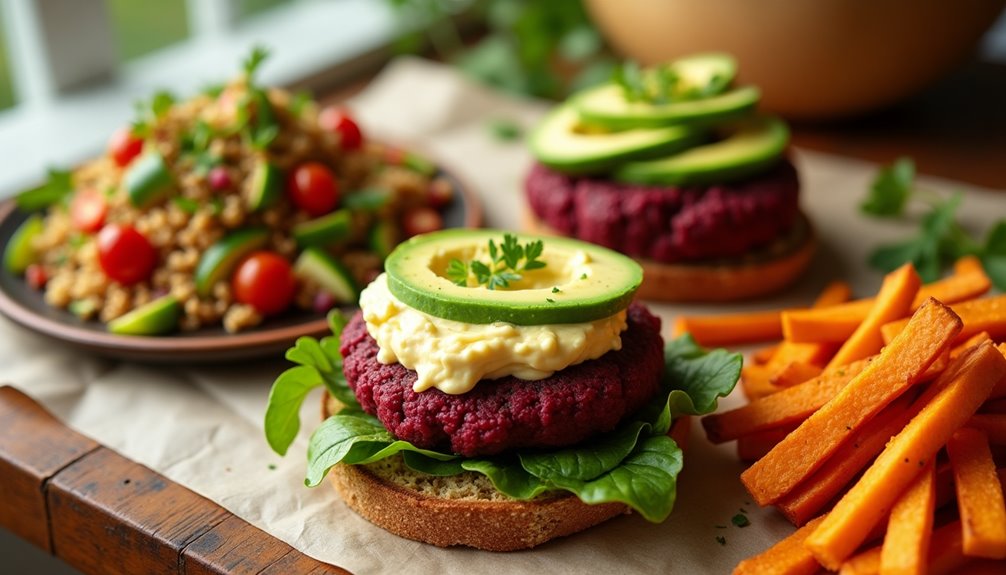
Meal planning not just prepares you for success in your vegan journey but also opens the door to exploring exciting alternatives for your favorite foods. One of the most popular ways to enjoy a classic meal while sticking to a vegan diet is through plant-based burgers. These burgers, crafted from ingredients like lentils, chickpeas, and quinoa, offer a hearty texture and rich flavor that can satisfy even the most devoted meat lovers. They're versatile and can be seasoned to mimic your favorite flavors, making sure you don't miss out on the taste you love.
When it comes to dairy alternatives, the choices are equally enticing. From almond milk to cashew cheese, there's a wide range of products that can seamlessly replace traditional dairy in your diet. For example, using coconut yogurt can add creaminess to your smoothies, while nutritional yeast can be sprinkled on popcorn or pasta, giving a cheesy flavor without the dairy.
It's crucial to be mindful of your nutritional needs, so look for fortified options that include vitamins B12 and D, as well as calcium. Many brands now offer products that are tailored to guarantee you receive the nutrients you need. Embracing a natural calorie cycle can also support your weight management while enjoying these delicious substitutes.
As you immerse yourself in these substitutes, you'll find that they not only cater to your cravings but also create a sense of belonging within the vegan community. By sharing your discoveries with others, you can inspire and support each other on this exciting journey toward a plant-based lifestyle.
Environmental Impact of Veganism
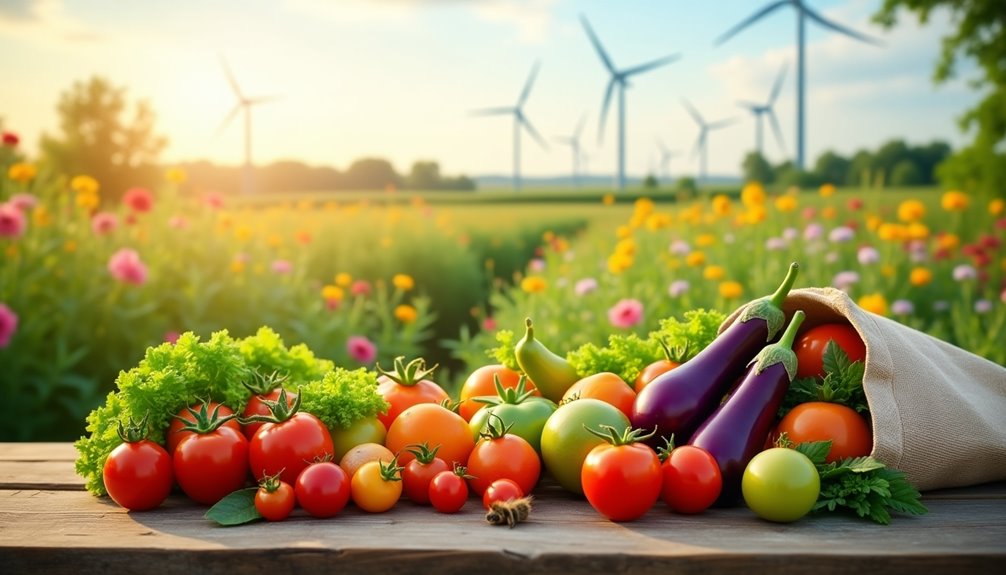
The environmental benefits of adopting a vegan diet are compelling and backed by extensive research. By opting for plant-based foods, you notably decrease your carbon footprint, which is a crucial factor in combating climate change. Studies show that animal agriculture contributes approximately 14.5% of global greenhouse gas emissions, mainly due to methane released from livestock and nitrous oxide from manure management. When you eliminate animal products from your diet, you're actively participating in a solution to this pressing issue.
Moreover, animal agriculture requires vast amounts of land, water, and resources. For example, producing just one pound of beef demands around 1,800 gallons of water, while plant-based foods like beans or lentils require much less. By transitioning to a vegan lifestyle, you help reduce deforestation and conserve precious water resources, making a positive impact on the planet.
It's also vital to acknowledge the biodiversity aspect. Animal farming can lead to habitat destruction, endangering countless species. By supporting a vegan lifestyle, you're contributing to a more sustainable ecosystem, allowing wildlife to thrive.
In essence, adopting a vegan diet isn't just a personal health choice; it's a potent environmental statement. When you embrace this lifestyle, you're not only fostering your well-being but also encouraging a collective movement toward a healthier planet. By joining others in this effort, you become part of a community dedicated to making a difference, showing that your choices can lead to meaningful change. Additionally, adopting a vegan lifestyle can lead to improved health benefits that contribute to overall well-being.
Getting Started With Veganism
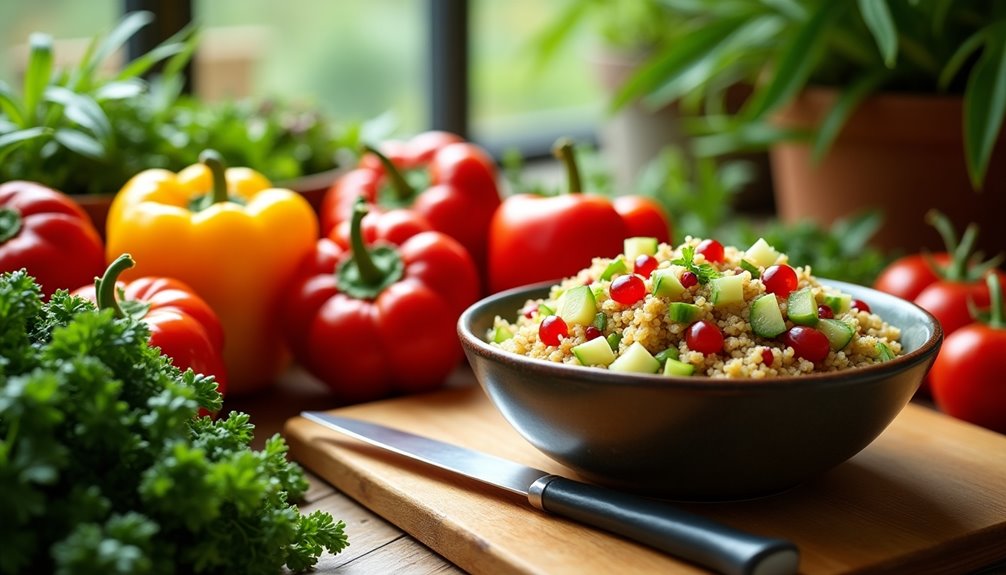
Starting a vegan adventure can appear daunting at first, but breaking it down into manageable steps makes the shift smoother and more enjoyable. Start by evaluating your current diet. Identify meals where you can easily swap animal products for plant-based options.
For example, try using almond milk instead of dairy or chickpeas instead of chicken in your salads. This not only simplifies the process but also helps you discover delicious alternatives.
Next, educate yourself about nutrition. It's crucial to guarantee you're getting all the essential nutrients, such as protein, iron, and vitamin B12, commonly found in animal products. Many plant-based options, like lentils, quinoa, and fortified foods, can help you meet these nutritional needs. Additionally, consider utilizing progress tracking tools to monitor your dietary changes effectively.
You might find it helpful to keep a food diary to track your intake and identify areas for improvement.
Join communities, either online or in-person, that share your interest in veganism. Engaging with others can provide support and inspiration, making you feel less isolated in your journey. You'll also discover new recipes and resources that can enrich your experience.
Frequently Asked Questions
Can Children Thrive on a Vegan Diet?
Yes, children can thrive on a well-planned diet that meets their nutrient needs. You'll need to guarantee they get adequate protein, iron, calcium, and vitamins, which are essential for their growth.
It's important to monitor their intake closely to address any growth concerns that may arise. Consulting with a healthcare professional or a nutritionist can help you create balanced meals, guaranteeing your child receives all the nutrients necessary for healthy development.
How Does a Vegan Diet Affect Athletic Performance?
Imagine fueling your body with vibrant fruits and hearty grains, transforming your athletic journey. A well-planned diet can enhance your energy levels, helping you conquer those long runs or intense workouts.
You might find that muscle recovery improves with the right balance of nutrients, like protein from legumes and nuts. Research shows athletes can perform at peak levels on plant-based meals, fostering a sense of belonging in a community that values health and performance.
Is Alcohol Vegan-Friendly?
When you're considering if alcohol's vegan-friendly, it's important to check the ingredients. Many beers are vegan, but some may use animal-derived fining agents. You'll find a variety of vegan beer options that suit your palate.
Similarly, some wines are made using animal products during the clarification process, but there are plenty of vegan wine choices available. Always look for labels or research brands to make sure you're making informed decisions for your lifestyle.
What Is the Cost Comparison of Vegan vs. Non-Vegan Diets?
When you explore the cost comparison of different diets, you might think you're entering a financial black hole! Budget considerations often reveal that non-vegan diets can be surprisingly expensive, especially when factoring in ethical concerns and environmental impact.
Vegan options might seem pricier upfront, but they can offer a better nutritional balance in the long run, potentially saving you money while aligning with your values.
You've got choices that support both your wallet and the planet!
Are There Vegan Options for Fast Food?
Absolutely, there are plenty of vegan options for fast food! Many chains now offer vegan fast food items, like burgers, wraps, and salads. Plus, you can find vegan convenience stores that specialize in ready-made meals and snacks. These options make it easier for you to grab a quick bite without compromising your values.
With the growing popularity of plant-based diets, it's a great time to explore these tasty alternatives in your area.
Conclusion
Embracing a vegan diet opens the door to a vibrant world of flavors and health benefits, nourishing both your body and the planet. Picture biting into a colorful salad, bursting with fresh produce, or savoring a rich, plant-based curry that warms your soul. By choosing veganism, you're not just transforming your meals; you're making a powerful statement for sustainability and compassion. So, take that step towards a healthier lifestyle, and watch how it enriches your life and the world around you.

